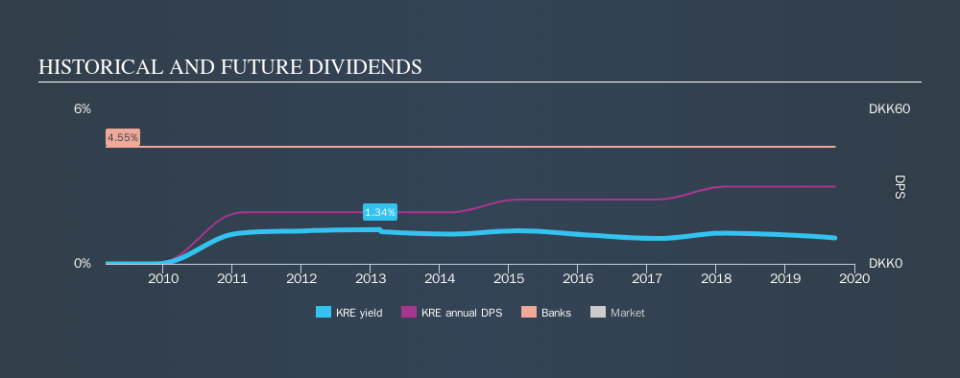Kreditbanken A/S (CPH:KRE) Is An Attractive Dividend Stock - Here's Why

Could Kreditbanken A/S (CPH:KRE) be an attractive dividend share to own for the long haul? Investors are often drawn to strong companies with the idea of reinvesting the dividends. Yet sometimes, investors buy a popular dividend stock because of its yield, and then lose money if the company's dividend doesn't live up to expectations.
With a 1.0% yield and a nine-year payment history, investors probably think Kreditbanken looks like a reliable dividend stock. A 1.0% yield is not inspiring, but the longer payment history has some appeal. Some simple analysis can offer a lot of insights when buying a company for its dividend, and we'll go through this below.
Click the interactive chart for our full dividend analysis
Payout ratios
Dividends are usually paid out of company earnings. If a company is paying more than it earns, then the dividend might become unsustainable - hardly an ideal situation. Comparing dividend payments to a company's net profit after tax is a simple way of reality-checking whether a dividend is sustainable. Kreditbanken paid out 9.8% of its profit as dividends, over the trailing twelve month period. We'd say its dividends are thoroughly covered by earnings.
We update our data on Kreditbanken every 24 hours, so you can always get our latest analysis of its financial health, here.
Dividend Volatility
Before buying a stock for its income, we want to see if the dividends have been stable in the past, and if the company has a track record of maintaining its dividend. The first recorded dividend for Kreditbanken, in the last decade, was nine years ago. The dividend has been quite stable over the past nine years, which is great to see - although we usually like to see the dividend maintained for a decade before giving it full marks, though. During the past nine-year period, the first annual payment was ø20.00 in 2010, compared to ø30.00 last year. This works out to be a compound annual growth rate (CAGR) of approximately 4.6% a year over that time.
It's good to see at least some dividend growth. Yet with a relatively short dividend paying history, we wouldn't want to depend on this dividend too heavily.
Dividend Growth Potential
While dividend payments have been relatively reliable, it would also be nice if earnings per share (EPS) were growing, as this is essential to maintaining the dividend's purchasing power over the long term. It's good to see Kreditbanken has been growing its earnings per share at 34% a year over the past five years. Earnings per share have grown rapidly, and the company is retaining a majority of its earnings. We think this is ideal from an investment perspective, if the company is able to reinvest these earnings effectively.
Conclusion
When we look at a dividend stock, we need to form a judgement on whether the dividend will grow, if the company is able to maintain it in a wide range of economic circumstances, and if the dividend payout is sustainable. We're glad to see Kreditbanken has a low payout ratio, as this suggests earnings are being reinvested in the business. We were also glad to see it growing earnings, although its dividend history is not as long as we'd like. Overall we think Kreditbanken is an interesting dividend stock, although it could be better.
Are management backing themselves to deliver performance? Check their shareholdings in Kreditbanken in our latest insider ownership analysis.
Looking for more high-yielding dividend ideas? Try our curated list of dividend stocks with a yield above 3%.
We aim to bring you long-term focused research analysis driven by fundamental data. Note that our analysis may not factor in the latest price-sensitive company announcements or qualitative material.
If you spot an error that warrants correction, please contact the editor at editorial-team@simplywallst.com. This article by Simply Wall St is general in nature. It does not constitute a recommendation to buy or sell any stock, and does not take account of your objectives, or your financial situation. Simply Wall St has no position in the stocks mentioned. Thank you for reading.

